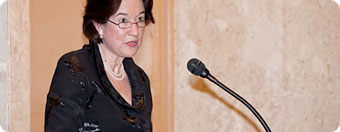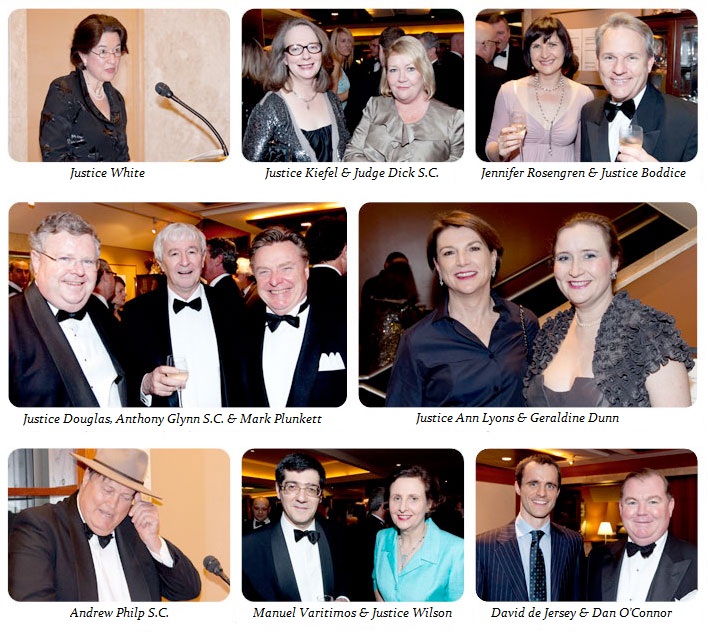FEATURE ARTICLE -
Issue 45 Articles, Issue 45: Nov 2010
Mr President, your Honours, visiting firemen, other distinguished guests and members of the Bar, Mr Philp, thank you for your toast to the Judiciary. That toast is an annual event that the Judges await with some considerable anxiety. This year’s has left us relatively unscathed, if relocated.
Mr Philp, my maternal grandfather-in-law, Fred Nicholson, initially a barrister, and who, I might say, played Rugby for Australia in 1903 and 1904, attributed an aphorism to your grandfather, Sir Roslyn Philp, which, those whose practice includes contentious probate matters will appreciate: “Nothing splits a family like a fiver!”
The Hon Ian Callinan QC was wont to say to aspiring young barristers eager to learn the trade from a master that you can never flatter a judge too much. You would think that aspirant advocates would take this to heart as it has been repeated so often.
But if you typed “flatter” plus “judges” into your favourite search engine before 4 August this year, only Geoffrey Robertson would come up as a person who knows how to flatter a judge. If you type in “how to flatter a judge” the only entry is, surprisingly, a local one: Hugh Fraser speaking for the Bar at the swearing in of Justice Muir to the Court of Appeal.
On 4 August there was an addition when the Commonwealth Solicitor-General made, some unkind commentators have suggested, a desperate bid to garner support, in Rowe v Electoral Commission and The Commonwealth (the “Get-Up Case”) when he said: “That was a point well made by your Honour Justice Hayne in Roche itself at paragraph 172 in dissent but no worse for that”, to which Justice Hayne replied, “I am not sure that is right Mr Solicitor. You can flatter one of us but you have got to flatter all seven of us simultaneously. ”
Riskily, you might think, the Solicitor-General responded, “I am working my way through the list your Honour”.
Sir Maurice Byers, a former Commonwealth Solicitor-General, recalled that when he started at the Bar in the late 1940s, the Supreme Court of New South Wales administered justice with an air of jocular brutality which definitely did not invite flattery.
Such parsimony with praise was not so in antiquity. It is a pity the classics are no longer a part of the education of the advocate, but I see with considerable pleasure that Justin Gleeson SC and Ruth Higgins of the New South Wales Bar have edited a splendid new book, “Rediscovering Rhetoric”.
Formally constructed praise once was an art form. The ancients were acutely aware of the transformative power of praise, the knack, if you will, of turning beer into champagne or, for your purposes, a growling bear of a judge whom nothing will please – “Is that your best point?” – into a purring pet who is putty in your hands – “That, Mr Stewart, is a very compelling argument”.
But our legal traditions are essentially Anglo-Saxon and some restraint is called for. So I would avoid copying the classicists too slavishly and applying their model to the modern judge. For example, Pliny the Younger, an active member of the Roman Bar in the first century AD:
“But what great harmony, what a symphony of all praise and of every glory has fallen to our Chief Justice! Nothing is detracted from his sternness by his good-humour, nothing from his gravity by his lack of pretension, nothing from his majesty by his essential humanity!”
However, we can always learn from our friends south of the border. It is said that when at the Bar the Hon David Hunt QC, formerly Mr Justice Hunt, had a very useful tool. He carried with him a notebook titled “How to Win Friends and Influence Judges”. In a no doubt painstaking exercise, he had compiled a book listing the cases in which then current sitting judges were recorded as having appeared as counsel. The exchange between Mr Hunt and the judge often went thus:
“DH: I wish to refer your Honour to Richard v Douglas, a profoundly important authority very much in point. It is reported in … oh, and by the way, and with respect, your Honour may recall appearing successfully as counsel for the plaintiff or defendant (as the case may be) in that matter …
HH: Ah, yes Mr Hunt … do go on.”
Of course, if you are flattering a woman judge it pays to be a little more subtle. You don’t have to bother much with the men as they believe any compliment automatically.
On the other hand you may be going a little too far if you state, after announcing your appearance,
“Before I commence my opening, may I say, your Honour, that my solicitor and I were astonished that your Honour was not appointed to the recent vacancy on the High Court.”
The real problem with many self-represented litigants is not so much that they are untutored in the law but that they do not know how to manage the judge who has the pleasure of hearing their case. Take Mr Kowalski,1 for example, in response to an observation by a very learned Federal Court Judge (and there are no others) said:
“Based on your last decision, your Honour, I can’t accept anything you say as being correct.”
Humbly, and, I would suggest wisely, his Honour responded:
“I fully appreciate that …”
Good manners in court help Bench, Bar and litigant through many an awkward moment but it may not be necessary to go so far as the accused in the dock, who, after being asked by the judge how did he plead, guilty or not guilty responded, “not guilty, your Honour and thank you for asking”.
On the other hand, it should never be necessary for a judge to write in his reasons, as Mr Justice Tomlinson did in The Three Rivers case, “Mr Gordon Pollock QC was only occasionally rude to me …”2
But even excellent counsel are not immune from slippage and sometimes counsel and the judge just don’t hit it off. In R v McIntyre3 things got very ragged. Justice Hulme, with whom the other members of the New South Wales Court of Criminal Appeal agreed, said of the conduct of counsel:
“Had I not read a transcript of it I would not have believed it possible that it could have occurred. In a word it was appalling.”
Counsel said he was instructed by his client to complain that he could not get a fair trial because the judge was prejudiced against him. “Furthermore”, counsel said
“I must say in honesty and fairness I suppose under the credo of veritas vos liberut [the court reporter struggled with that and put a question mark in the transcript] I agree with my client.”
Shortly afterwards, when the trial judge sought to intervene in his cross-examination, counsel said:
“Let me finish. I am sick of this farce of a trial. I’ve had nothing but opposition from you and Mr Crown and, it seems to me, I’ve mentioned it before, you are incompetent to have heard this trial because of your open, obvious prejudice against my client and, now me personally, and in favour of the Crown.”
Later, counsel indicated that he would not be available for health reasons on Tuesday to continue the trial and the judge sought a comprehensive medical report from his doctor. Counsel responded:
“I hate to end the afternoon on a sour note because things were going along pretty well the last hour or two, but your Honour, I’ll come here on my death bed and gurney before I’d give you the satisfaction of getting a letter from my doctor as a school kid does to ask his principal to go to the toilet. I’ll come on my death bed first. How absolutely absurd! The gall and audacity of you to ask me such a thing amazes me… Monday I will not be here. I’ll show up Tuesday, my friend, if I have to come here on my death bed.”
Even if you and the judge are not emulating Darby and Joan, I suggest you do not respond to a testy judge as did one fawning lawyer to an increasingly exasperated woman judge:
“Before I address the jury, your Honour, I’d just like to say you’re beautiful when you are mad.”
There were, of course, soothing counsel such as George Spencer Bower of whom it was said that a point of law tossed up in argument might give him occasion to quote 100 lines of Shakespeare, Homer or Sophocles. Indeed he could, if it were appropriate, recite the whole of “Oedipus Tyrannus”. Perhaps the downside of a classical education. Now there was a counsel whose appearance on a busy chamber day would lift a judge’s spirits.
On the whole there is something of a resistance in the common law to the art of pleasing which may account for the enormous number of quotes and examples of barbs, insolence, swipes and contempt towards the Bench but a real dearth of bouquets and obsequiousness.
Nonetheless, hearty laughter from the Bar to the Bench’s jests is as well to be kept toned down. We know we are not very funny and may not appreciate the reminder if you laugh too strenuously.
In truth, the Bar and Bench are very fond of each other. Barristers do need the support of the judges, borne out recently when, searching an arcane point in the 1908 edition of Halsbury, I noted that the entry for “Barristers” lay between “Bankruptcy” and “Bastardy” and that the first reference to “Barristers” outside the Inns of Court was in the “Statute of Sewers” in 1531.
It is, let me say, impossible to conceive of the performance of judicial duties in Australia without the assistance of the Bar in virtually every case.
It is not, of course, every barrister who will have the gift, as did Sir Garfield Barwick, of “making the binomial theorem sound like the alphabet”. It was said of him that he could make the dullest judge understand and that it was always lightly done.
So, ladies and gentlemen of the Bar keep steadily in mind that ours is a symbiotic relationship and the advocate’s part of it is to persuade the judges to reach the correct decision and too much flattery may derail the task. The learned editors of “Rediscovering Rhetoric” quote, with considerable effect, Isocrates, as true today as in the fourth century BC,
“We regard speaking well to be the clearest sign of a good mind, which it requires, and truthful, lawful and just speech we consider the image of a good and faithful soul. With speech we fight over contentious matters and we investigate the unknown … If we must summarize the power of discourse, we will discover that nothing done prudently occurs without speech, that speech is the leader of all thoughts and actions, and that the most intelligent people use it most of all.”
Footnotes
- Kowalski v MMAL Staff Superannuation Fund (2009) 178 FCR 401 at [56].
- [2006] EWHC 816.
- [2000] NSWCCA 6.




